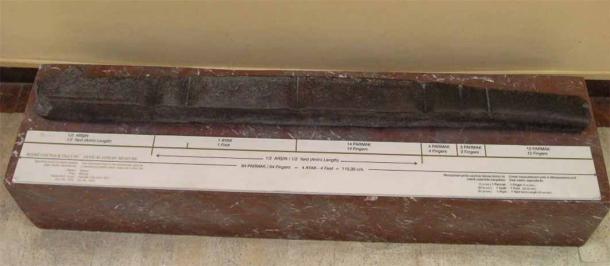A journey in search of the discovery of an ancient lost civilization that is more than 12,000 years old, supported by solid archaeological standards and evidence, provides indications that its global reach was not for domination that is unfortunately too common in the rise of civilizations, but instead for illumination and common unity of cultures all over the world. The archaeological precept that provides confirmation of a global ancient civilization with a purpose of sharing both its science and spiritual philosophy, is a universal unit of measurement of 27.5 inches (70 centimeters); in the ancient Egyptian record it is called a nebiu (nbj: to yoke together) or an aakhu meh (Spirit of Light Cubit).

Egyptian cubit rod in the Liverpool World Museum ( Public Domain )
Ancient Metrology
Evidence pointing to the existence of this lost global civilization, is provided through the neglected branch of archaeology called ancient metrology; the study of cultures’ weights and measures. Ancient metrology is an area of study that does not enjoy the deserved attention of most archaeologists or the general public. In general, archaeologists are literally and figuratively buried in their own specific field of study, be it Maya cultures , Ancestral Puebloan or Egyptology as examples, not only digging for history, but digging for funding, ending up in the “silos” of their field of expertise. Ancient metrology research does not receive 24 pt. font size press headlines such as Howard Carter discovering “Wonderful Things” in Egypt’s Valley of the Kings, nor does the subject become the unique selling point of blockbuster movies of dashing swashbuckling archaeologists traveling the world, fighting battles and enemies to retrieve sacred lost relics. Studies of ancient measurements languish hidden in mountains of archaeological papers or as obscure museum exhibits passed over, unseen, as opposed to the dazzling and eye-catching artifacts, displayed to draw the public’s attention.

The Nippur cubit-rod in the Archaeological Museum of Istanbul, Turkey ( Ana al’ain / CC BY-SA 3.0 )
Yet, the actual incredible discovery of wonderful things and a true global adventure beyond the scope of any movie, is to be found in multiple civilizations sharing a common measurement and measurement system in ancient times. To position this in a scientific archaeological setting is a quote from a 2013-paper by Vanpool and colleagues, about the significance of ancient metrology: “ As early as Sir William Petrie (1879), archaeologists argued that metrology could provide valuable cross-cultural data and show historical relationships, but metrology studies tend to be infrequent and limited in scope. They have not been placed within a general anthropological framework, which is unfortunate given that metrology impacts and reflects a culture’s cosmological, economic, and technological structure.”
Like this Preview and want to read on? You can! JOIN US THERE ( with easy, instant access ) and see what you’re missing!! All Premium articles are available in full, with immediate access.
For the price of a cup of coffee, you get this and all the other great benefits at Ancient Origins Premium. And – each time you support AO Premium, you support independent thought and writing.
Donald B. Carroll spent his career working in Fire &Rescue, as a firefighter/paramedic, company officer, district chief, and an academy instructor. He pursued the meaning of life through extended study into scientific, spiritual, and philosophical materials and is a regular speaker and writer of metaphysical topics, ancient culture symbolism, and a tour leader to many of the ancient sites he has written about.
He is the author of Sacred Geometry and Spiritual Symbolism: The Blueprint for Creation and The Spirit of Light Cubit: The Measure of Humanity and Spirit
Top Image : Metrological Relief in the Ashmolean museum ( :geni/ CC BY-SA 4.0 )
Related posts:
Views: 0
 RSS Feed
RSS Feed

















 December 8th, 2022
December 8th, 2022  Awake Goy
Awake Goy  Posted in
Posted in  Tags:
Tags: 
















